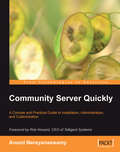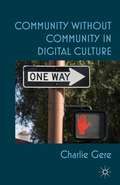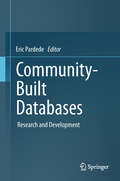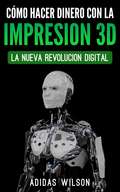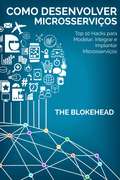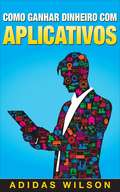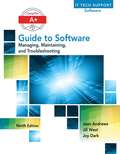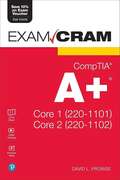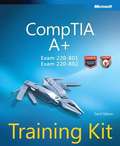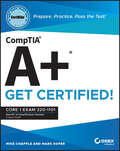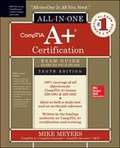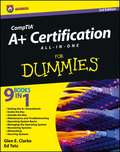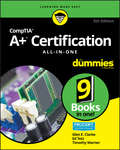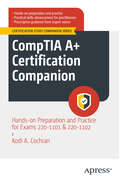- Table View
- List View
Community Server Quickly
by Anand NarayanaswamyWith this book in hand, you will be able to set up and manage a Community Server solution. You will learn how to create blogs, forums, photo galleries, and file galleries, and use tools such as the built-in RSS reader and RSS roller in a step-by-step manner. This book will provide your with a clear and concise overview of Community Server and will impart the knowledge necessary to enable you to run and manage a Community Server solution. This book is aimed at the Community Server administrator with a base level of technical competence and confidence, but no prior sysadmin or developer experience or knowledge. No knowledge of ASP.NET programming is required for using this book. What is essential is your own passion for your target community and your desire to provide the best platform possible to that audience.
Community Structure of Complex Networks (Springer Theses)
by Hua-Wei ShenCommunity structure is a salient structural characteristic of many real-world networks. Communities are generally hierarchical, overlapping, multi-scale and coexist with other types of structural regularities of networks. This poses major challenges for conventional methods of community detection. This book will comprehensively introduce the latest advances in community detection, especially the detection of overlapping and hierarchical community structures, the detection of multi-scale communities in heterogeneous networks, and the exploration of multiple types of structural regularities. These advances have been successfully applied to analyze large-scale online social networks, such as Facebook and Twitter. This book provides readers a convenient way to grasp the cutting edge of community detection in complex networks. The thesis on which this book is based was honored with the "Top 100 Excellent Doctoral Dissertations Award" from the Chinese Academy of Sciences and was nominated as the "Outstanding Doctoral Dissertation" by the Chinese Computer Federation.
Community without Community in Digital Culture
by Charlie GereCommunity Without Community in Digital Culture presents the view that our digital culture is determined not by greater connection, but by the separation and gap that is a necessary concomitant of our fundamental technicity.
Community-Built Databases: Research and Development
by Eric PardedeWikipedia, Flickr, You Tube, Facebook, LinkedIn are all examples of large community-built databases, although with quite diverse purposes and collaboration patterns. Their usage and dissemination will further grow introducing e.g. new semantics, personalization, or interactive media. Pardede delivers the first comprehensive research reference on community-built databases. The contributions discuss various technical and social aspects of research in and development in areas like in Web science, social networks, and collaborative information systems. Pardede delivers the first comprehensive research reference on community-built databases. The contributions discuss various technical and social aspects of research in and development in areas like in Web science, social networks, and collaborative information systems.
Como Administrar um Negócio Online
by Sephora Black Flávia MachadoAs 26 melhores dicas e truques que vão te ajudar a começar e administrar um negócio online de sucesso Um livro que você precisa ter! Nunca houve melhor hora para começar um negócio online do que os dias de hoje. Mas existe uma grande diferença em fazer e fazer bem feito. Neste livro você vai aprender a: Apresentar o seu produto Anunciar online Construir uma marca Se conectar com seus clientes E muito mais!
Como Fazer Seu Próprio Website Grátis E Também Seu Blog Grátis
by Jason Matthews Claudia RibeiroQuer ter seu próprio website ou aprender como criar seu blog? O que você acha de um construtor de website sem custo mensal? Você pode construir o seu; é fácil para qualquer um criar um website e começar com sites como Wordpress e Blogger - mesmo que você não saiba nada sobre web design. Não há necessidade de aprender o código HTML porque é simples com o termo de ferramentas de edição WYSIWYG (what you see is what you get: o que você vê é o que você obtém). Este livro é escrito em uma linguagem que qualquer um pode entender, desde usuários de computador iniciantes até avançados irão se beneficiar de dicas extras. Com este guia você aprenderá a: Construir websites gratuitos Criar blogs gratuitos Personalizar seus aplicativos Vender com botões de pagamento PayPal Direcionar o tráfego com Facebook, Twiter, YouTube, Google Plus Maximizar SEO (otimização para mecanismos de busca) Aumentar a classificação no Google-Bing Apresentar artigos e comunicados de imprensa Aumentar a lista de contatos de e-mails E muito mais É fácil, divertido e você aproveita o melhor de todas as ferramentas gratuitas, com a garantia de que economiza tempo, dinheiro e esforço. Hoje é o dia para você dar um salto, iniciar sua presença online e fazer seu próprio website gratuito! Os assuntos incluem: Wordpress, Blogger, web design, website gratuito, construtor de website gratuito, escrevendo o seu blog, criação de website, como criar um blog, SEO, Google, Yola, Webs.
Como Hacer Dinero Con La Impresion 3D: La Nueva Revolucion Digital
by Adidas WilsonDESCRIPCIÓN A medida que se populariza la impresión 3D, muchos han aprovechado esta industria para labrarse una fortuna y ganar en grande. Estos resultados no son ciertamente pan comido, pero por otra parte la única manera de tener éxito es salir a buscarlo, y revisar qué han hecho quienes han logrado conceptualizar esta forma de hacer dinero. Si ha estado siempre interesado en la impresión 3D y quiere hacer dinero con esta tecnología, es hora de que piense inteligentemente y venza cualquier obstáculo que se presente. Los modelos que quiera imprimir en 3D puede crearlos con un paquete CAD (diseño asistido por computador), con un escáner 3D, o con una simple cámara digital y un software de fotogrametría. Los modelos con CAD resultan con menos errores y pueden corregirse antes, pues permiten la verificación del diseño del objeto antes de imprimirlo. Hay varios proyectos y empresas esforzándose por desarrollar impresoras 3D accesibles para su uso personal en su casa. Gran parte de este trabajo ha sido movido y orientado por comunidades hágalo-usted-mismo, aficionados a hacer cosas, innovadores, con lazos adicionales al mundo académico y miembros de comunidades de hackers. La impresión tridimensional hace que sea igual de barato imprimir una pieza que miles y por esto le quita el atractivo a la economía de escala. Puede llegar a tener un impacto tan grande a nivel mundial como lo tuvo en su momento la revolución industrial y el surgimiento de las fábricas… Así como nadie podía prever en 1750 el impacto que tendría la máquina de vapor, en 1450 el que tendría la imprenta, o en 1950 lo que sería el impacto del transistor, en este momento no es posible predecir el impacto a largo plazo de la impresión 3D. Pero la tecnología está llegando, y es probable que revolucione cada uno de los campos que toque. — Tomado de “The Economist” edición líder de Febrero 10, 2011
Como Publicar Um Ebook Sem Dar Em Maluco. E Que Alguém O Leia
by Alejandro Aguayo Catarina LopesGuia prático, passo a passo, sobre como publicar um livro electrónico, sem dramas e sem os erros típicos de principiante. Oferece truques, recursos, programas e, principalmente, a experiência de muitos autores indie que triunfam hoje em dia com os seus eBooks, como Blanca Miosi, Bruno Nievas, Enrique Laso, Gabri Ródenas, Lidia Herbada, Roberto López-Herrero, Largo Javariega, entre outros.
Como comenzar un negocio en línea en 7 pasos
by Tolga CakirEste libro revelará estrategias prácticas diseñadas para ayudar a los lectores que deseen iniciar un negocio en línea pero que no saben por dónde empezar. Tolga Cakir escribió este libro como el primer volumen que está en un lenguaje sencillo con el objetivo de ayudar a los lectores no técnicos de todo el mundo.
Como criar, divulgar e vender e-books – sem gastar nada
by Jason Matthews Lia Gabriele Regius"Como criar, divulgar e vender ebooks - sem gastar nada" era o que faltava para quem já tirou seu livro da gaveta, mas ainda não sabe como colocá-lo no mercado. E o mais importante: sem custo algum. Pensando tanto nos leitores que se sentem em casa navegando na internet quanto nas pessoas que não sabem muito bem como lidar com todas as informações da rede, Jason Matthews e Lia Gabriele Regius prepararam um conteúdo abrangente. Você vai aprender absolutamente tudo desde a criação de blogs até a otimização de palavras-chave, passando por técnicas fáceis de divulgação e venda. Durante a leitura, você terá acesso a ferramentas de marketing que nunca imaginou que existiam. Aprenderá a adequar seu livro para os formatos mais usados pelos dispositivos de leitura digital. E quando terminar o último capítulo, você perceberá que o mercado de publicação independente nunca foi tão fácil.
Como desenvolver Microsserviços: Top 10 Hacks para Modelar, Integrar e Implantar Microsserviços
by The BlokeheadEste livro é uma análise sobre microsserviços e como desenvolve-los. Partindo de sua definição, a publicação é um guia para ajudar o leitor a compreer essa tecnologia melhor. Depois de ler este livro, você saberá como e onde os microsserviços são utilizados. Os seguintes tópicos foram discutidos neste livro: 1. Heterogeneidade tecnológica, resiliência, selagem e implantação - Hacks # 1 e # 2 2. Gerenciando Sistemas Complexos - Hacks # 3 e # 4 3. Listas de Controle - Hack # 5 4. Integração - Hacks # 6 a # 10 5. E muito, muito mais ...
Como escrever um ebook em um mês: Passos e dicas para ter Foco, Motivação e ser Criativo
by Beautrice NorfolkVocê quer escrever um livro sem muito esforço no menor tempo possível? Você quer escrever um romance de forma mais rápida e eficaz? Você sabia que o dictation software pode ajudá-lo a escrever seu livro até 3 vezes mais rápido? Se você respondeu sim, então este livro é para você! Se você quer aprender a escrever seu romance falando, este livro também é para você! Este guia apresenta estratégias extraordinárias para ditar seu romance tudo a partir do conforto da sua sala de estar sem tocar em um teclado! Aqui estão os tópicos deste livro: •Como começar •Como se preparar e fazer seu esboço •O melhor discurso para aplicativos de texto •Como usar o dictation software para publicar um romance •+ MUITO MAIS! -> Role até o topo da página e clique em adicionar ao carrinho para comprar instantaneamente Aviso Legal: Este autor e detentor de direitos não fazem reivindicações, promessas ou garantias sobre a exatidão, integridade ou aplicação do conteúdo deste livro, e se isenta expressamente da responsabilidade por erros e omissões nos conteúdos nele contidos. Este produto é apenas para referência. Gênero: COMPUTADORES / Documentação e Redação Técnica Gênero Secundário: NÃO FICÇÃO JUVENIL / Linguagem / Composição e Escrita Criativa Língua: Português Brasil
Como ganhar dinheiro com aplicativos
by Adidas WilsonO mercado de aplicativos continua crescendo a cada dia. Pessoas de todo o mundo estão usando aplicativos para estilo de vida, negócios, jogos e praticamente tudo o mais. Muitos outros estão interessados em criar seus próprios aplicativos e a constante pergunta em suas mentes é: "quanto custa?" Bem, não é tão caro. Através deste livro, você será capaz de compreender de que forma você poderá ganhar dinheiro através de aplicativos.
Como hacer, mercadear y vender ebooks - todo gratis
by Jason Matthews Maria JimenezTodo para los escritores que venden ebooks. La edición electrónica habilita a los autores independientes para retener la mayor parte de las regalías. Descubra la mejor manera para: Usar las redes sociales - construir una plataforma en línea de autor Formatear y subir documentos para Amazon, Smashwords, Barnes & Noble, Apple, Google y otros. Convertir documentos a cualquier formato (epub, mobi, pdf y muchos más) Vender libros en línea Crear un sitio web Hacer un blog Diseñar cubiertas para libros electrónicos Crecer con SEO (search engine optimization) en Google-Bing Vender libros con Paypal en su propio sitio -en piloto automático- Hacer libros impresos Usar las relaciones públicas para conseguir tráfico a su sitio. Y mucho más. Lleno de información, ejemplos, más de 250 vínculos a sitios y software que le permitirán lograr sus objetivos con los canales de distribución y sus sitios web. Suficientemente simple para los principiantes y relevante para los expertos, quienes puede utilizar la orientación adicional. Es como tener diez libros en uno solo, la única fuente con todo lo que usted necesita para ser exitoso.
Como usar a Apple TV 4K: Um guia de uso para a Apple TV com o Controle Remoto Siri
by Adidas WilsonQuando se ouve falar em Apple TV, as pessoas pensam automaticamente que estão comprando um aparelho de televisão. Mas não é isso. A Apple TV é, na verdade, um aparelho usado para streaming, parecido com o Fire, da Amazon ou com o Roku. É uma caixinha preta de quase quatro centímetros de altura, e quase dez centímetros de largura, e usa uma plataforma similar à do iPad e iPhone. É possível fazer o download de uma lista de aplicativos e jogos, algo que vai além das plataformas comuns de streaming como Hulu, Netflix e Amazon, por exemplo. A Apple TV é centrada em vários aplicativos, e ainda é capaz de transmitir vários seriados e filmes diretamente na sua HDTV, mas essa é só a ponta do iceberg de todos os usos que essa caixinha disponibiliza. Com essa caixa você pode assistir e ouvir podcasts, jogar seus jogos favoritos, ouvir a sua playlist de academia, e muito mais. Mas é importante mencionar que para aproveitar todos os benefícios que esta caixa está pronta para proporcionar, é preciso instalar os aplicativos. Alguns dos aplicativos são gratuitos, outros são pagos. Pense dessa forma; a Apple TV pode transformar a sua televisão em uma TV Smart. Você pode alugar seus filmes favoritos ou assistir à coleção da sua conta do iTunes. Você também pode assistir filmes e seriados nos aplicativos como Netflix e Hulu Plus; e ouvir música dos aplicativos Pandora e Apple Music. A lista de coisas que a Apple TV pode fazer por você é interminável. A Apple TV 4K foi feita com alguns dos processadores mais rápidos que existem, os mesmos do iPad Pro. A caixa da Apple TV foi projetada para ser tão potente quanto a maioria dos laptops que usamos. Ela também tem processadores gráficos velozes que foram projetados para transformar a caixinha preta em um console de videogame. Nada parece ser melhor do que isso. A Apple realmente deu uma nova cara à nova geração, mas isso não significa que você deva jogar o seu modelo antigo fora, é a mesma cois
Comp TIA A+ Guide to Software: Managing, Maintaining, and Troubleshooting
by Jean Andrews Joy Dark Jill WestThis step-by-step, highly visual text provides a comprehensive introduction to managing and maintaining computer hardware and software. Written by best-selling author and educator Jean Andrews, A+ Guide to Software, Ninth Edition closely integrates the CompTIA A+ Exam objectives to prepare students for the 220-902 certification exam. The new Ninth Edition also features extensive updates to reflect current technology, techniques, and industry standards in the dynamic, fast-paced field of PC repair and information technology. Each chapter covers both core concepts and advanced topics, organizing material to facilitate practical application and encourage students to learn by doing. The new edition features more coverage of security, virtualization, new coverage of cloud computing, Linux and Mac OS, and increased emphasis on mobile devices. Supported by a wide range of supplemental resources to enhance learning with Lab Manuals, CourseNotes, online labs and the optional MindTap that includes labs, certification test prep and interactive exercises and activities, this proven text offers students an ideal way to prepare for success as a professional IT support technician.
CompTIA A+ Core 1 (220-1101) and Core 2 (220-1102) Exam Cram
by David L. ProwseCompTIA A+ Core 1 (220-1101) and Core 2 (220-1102) Exam Cram is an all-inclusive study guide designed to help you pass the updated versions of the CompTIA A+ exams. Prepare for test day success with complete coverage of exam objectives and topics, plus hundreds of realistic practice questions. Extensive prep tools include quizzes, Exam Alerts, and our essential last-minute review CramSheet. The powerful Pearson Test Prep practice test software provides real-time assessment and feedback with four complete exams. <p><p> Covers the critical information needed to score higher on your CompTIA A+ Core 1 (220-1101) and Core 2 (220-1102) exams! <p>* Install, configure, and troubleshoot PC hardware including CPUs, RAM, video cards, network cards, storage drives, and peripherals <p>* Work effectively with mobile devices: laptops, tablets, and smartphones <p><p>* Configure Windows settings, components, and administrative tools <p>* Manage and troubleshoot Linux, macOS, Android, and iOS <p>* Administer and support basic IT infrastructure including IP networking, IoT devices, virtualization, cloud-based systems, and backup systems <p>* Understand security features such as firewalls, multifactor authentication, permissions, and access control * Defend against malware, network threats, and social engineering <p>* Learn the basics of IT documentation, change management, and incident response <p><p> Prepare for your exam with Pearson Test Prep <p><p>* Realistic practice questions and answers <p>* Comprehensive reporting and feedback <p>* Customized testing in study, practice exam, or flash card modes <p>* Complete coverage of A+ Core 1 (220-1101) and Core 2 (220-1102) exam objectives
CompTIA A+ (Exam 220-801 and Exam 220-802) Training Kit
by Darril GibsonCompTIA A+ Exams 220-801 and 220-802 candidates can ace their preparation with this training kit that allows them to work at their own pace through a series of lessons and practical exercises, and then assess their computing technology skills with the online practice test--featuring multiple, customizable testing options to meet their specific needs.
CompTIA A+ CertMike: Core 1 Exam 220-1101 (CertMike Get Certified)
by Mike Chapple Mark SoperSkip the fluff and get straight to the essentials with an indispensable prep handbook for the CompTIA A+ Core 1 exam In CompTIA A+ CertMike: Prepare. Practice. Pass the Test! Get Certified! Core 1 Exam 220-1101, veteran tech experts and educators Mike Chapple and Mark Soper deliver a hands-on and practical roadmap to taking—and succeeding on—the CompTIA A+ Core 1 exam. You’ll learn how to install, configure, and maintain computer equipment, mobile devices, and software for end users, service components based on customer requirements, understand networking basics, and apply essential cybersecurity methods. Ace the test using the proven CertMike approach: Prepare -- CertMike is your personal study coach, guiding you through all the exam objectives and helping you gain an understanding of how they apply to on-the-job tasks! Practice -- Each chapter includes two multiple choice practice questions. Work through the detailed explanations to evaluate each answer option and understand the reason for the best answer! Pass -- On exam day, use the critical knowledge you've learned when you’re ready to take the test. You'll feel ready and confident to pass the exam and earn your certification! With a laser-focus on getting you job- and exam-ready, the book skips the fluff and gets right to the point of getting you familiar with IT basics and on the road to an in-demand IT certification and a new career in tech. You’ll also get complimentary access to additional online study tools, complete with a bonus practice exam and audio recordings of the CertMike Exam Essentials. Banish test anxiety and feel ready to pass the test—the first time around! An indispensable resource for anyone preparing for their A+ certification, CompTIA A+ CertMike: Prepare. Practice. Pass the Test! Get Certified! Core 1 Exam 220-1101 is also a must-read for hardware and PC technicians seeking to upgrade their skillset.
CompTIA A+ CertMike: Core 2 Exam 220-1102 (CertMike Get Certified)
by Mike Chapple Mark SoperSkip the fluff and get straight to the essentials with an indispensable prep handbook for the CompTIA A+ Core 2 exam In CompTIA A+ CertMike: Prepare. Practice. Pass the Test! Get Certified!Core 2 Exam 220-1102, veteran tech experts and educators Mike Chapple and Mark Soper deliver a hands-on and practical roadmap to taking—and succeeding on—the CompTIA A+ Core 2 exam. You’ll learn how to install, configure, and maintain computer equipment, mobile devices, and software for end users, service components based on customer requirements, understand networking basics, and apply essential cybersecurity methods. Ace the test using the proven CertMike approach: Prepare -- CertMike is your personal study coach, guiding you through all the exam objectives and helping you gain an understanding of how they apply to on-the-job tasks! Practice -- Each chapter includes two multiple choice practice questions. Work through the detailed explanations to evaluate each answer option and understand the reason for the best answer! Pass -- On exam day, use the critical knowledge you've learned when you’re ready to take the test. You'll feel ready and confident to pass the exam and earn your certification! With a laser-focus on getting you job- and exam-ready, the book skips the fluff and gets right to the point of getting you familiar with IT basics and on the road to an in-demand IT certification and a new career in tech. You’ll also get complimentary access to additional online study tools, complete with a bonus practice exam and audio recordings of the CertMike Exam Essentials. Banish test anxiety and feel ready to pass the test—the first time around! An indispensable resource for anyone preparing for their A+ certification, CompTIA A+ CertMike: Prepare. Practice. Pass the Test! Get Certified! Core 2 Exam 220-1102 is also a must-read for hardware and PC technicians seeking to upgrade their skillset.
CompTIA A+ Certification All-in-One Exam Guide: Exams 220-1001 & 220-1002
by Mike MeyersThis bestselling on-the-job reference and test preparation guide has been fully revised for the new 2019 CompTIA Core 1 and Core 2 CompTIA A+ exam objectives <p><p> This fully revised and updated resource offers complete coverage of the latest release of CompTIA A+ exams 220-1001 & 220-1002. You'll find learning objectives at the beginning of each chapter, exam tips, practice exam questions, and in-depth explanations. Designed to help you pass the CompTIA A+ exams with ease, this definitive guide also serves as an essential on-the-job IT reference.
CompTIA A+ Certification All-in-One For Dummies
by Glen E. Clarke Edward TetzComprehensive coverage of everything you must know to pass CompTIA's A+ examA+ is the gateway certification into many IT careers, and interest in certification is exploding. This bestselling A+ certification guide is updated to cover the new A+ exam. It includes the new Windows coverage and reflects the revised emphasis on objectives. Nine minibooks focus individually on specific hardware and OS characteristics including installation and configuration, diagnostics, preventive maintenance, motherboard and processors, printers, networking, and fundamentals. A companion website contains the popular Dummies Test Engine test-prep software.A+ certification is the first step toward a variety of IT careers, and this guide is fully updated for the latest revision of the examNine minibooks cover the domains of the exam in detail, reflecting the enhanced emphasis on hardware and new Windows contentCovers installation, configuration, and upgrading; diagnosing and troubleshooting; preventive maintenance; motherboards, processors and memory; printers; networking; and OS fundamentalsCompanion website provides the popular Dummies Test Engine, an exclusive, customizable test-prep software package now with twice as many sample test questions as previous editionsAnyone seeking CompTIA A+ certification will be better prepared with help from CompTIA A+ Certification All-in-One For Dummies, 3rd Edition.
CompTIA A+ Certification All-in-One For Dummies
by Glen E. Clarke Edward Tetz Timothy WarnerAll the knowledge you need to pass the new A+ exam A+ is the gateway certification into many IT careers and can be essential in order to start your occupation off on the right foot in the exciting and rapidly expanding field of information technology. Luckily, the 9 minibooks in CompTIA A+ Certification All-in-One For Dummies make it easier to prepare for this all-important exam so you can pass with flying colors! It quickly and easily gets you up to speed on everything from networking and computer repair to troubleshooting, security, permissions, customer service--and everything in between. The CompTIA A+ test is a rigorous exam, but the experts who wrote this book know exactly what you need to understand in order to help you reach your certification goal. Fully updated for the latest revision of the exam, this comprehensive guide covers the domains of the exam in detail, reflecting the enhanced emphasis on hardware and new Windows content, as well as the nuts and bolts, like operating system basics, recovering systems, securing systems, and more. Find new content on Windows 8, Mac OS X, Linux, and mobile devices Get test-taking advice for the big day Prepare for the A+ exam with a review of the types of questions you'll see on the actual test Use the online test bank to gauge your knowledge--and find out where you need more study help With the help of this friendly, hands-on guide, you'll learn everything necessary to pass the test, and more importantly, to succeed in your job!
CompTIA A+ Certification All-in-One For Dummies
by Timothy L. Warner Glen E. Clarke Edward TetzFully updated to cover the 2019 exam release! CompTIA's A+ certification is an essential certification to building a successful IT career. Test takers must pass both 90-question exams to be certified, and this book—plus online test bank—will help you reach your certification goal. The 9 minibooks map to the exam's objectives, and include new content on Windows 10, Scripting, Linux, and mobile devices. You’ll learn about how computers work, networking, computer repair and troubleshooting, security, permissions, and customer service. You'll also find test-taking advice and a review of the types of questions you'll see on the exam. Use the online test bank to test your knowledge and prepare for the exam Get up to speed on operating system basics Find out how to manage the operating system Discover maintenance and troubleshooting tips Inside is all the knowledge you need to pass the new A+ exam!
CompTIA A+ Certification Companion: Hands-on Preparation and Practice for Exams 220-1101 & 220-1102 (Certification Study Companion Series)
by Kodi A. CochranThis book covers all topics and requirements of the CompTIA A+ certification exam. It will allow readers to easily understand the concepts, information, and skills needed to obtain the associated certification. CompTIA A+ certification is at its core an entry-level certification to the information technology world, including cybersecurity. It is comprised of a set of two exams (Exams 220-1101 & 220-1102) created by IT industry professionals that validate skills needed for entry-level IT jobs, including cybersecurity. This certification stands as baseline proof of knowledge of these topics and is largely sought by recruiters. Main exam topics include hardware, networking, mobile devices, security, Windows operating system, other IOS technologies, software troubleshooting and operations procedures. This book has been designed to follow the core requirements for the full scope of the CompTIA A+ certification, covering both examination test requirements. It has been formatted to follow a logical and easy to follow order to allow a foundational level of understanding prior to moving onto more advanced topics. The book will provide all readers with the appropriate knowledge and information to have a foundational level of many Information Technology components. It will primarily serve the newer entrants to the field but will also support more experienced individuals that are looking towards certifications. What You Will Learn: Effective communication with clients and colleagues and interpersonal skills for collaboration in team environments. Understanding of motherboard components and architecture. Knowledge of CPU types and socket compatibility. Installation and configuration of operating systems. Software troubleshooting techniques. Installation and configuration of Windows, Linux, and macOS. Management of system settings and user accounts. Identification of laptop components and peripherals. Maintenance procedures for laptops, including cleaning and battery management. Configuration of mobile device settings and preferences. Understanding of mobile operating systems and app installation procedures. Troubleshooting common printer hardware and software issues. Basic networking concepts, including IP addressing and subnetting. Configuration of network devices such as routers and switches. Configuration and management of wireless access points. Implementation of wireless security protocols such as WPA2 and WPA3. Understanding of cloud service models (IaaS, PaaS, SaaS). Deployment and management of virtual machines in the cloud. Recognition of common security threats and vulnerabilities. Implementation of security best practices for data protection. Who this book is for: Anyone that is looking to get into the information technology or cybersecurity fields. This would also include academics looking to pursue bachelor’s or master’s degrees, as often programs include the A+ certification. There is no necessary prior skill experience or knowledge needed.
